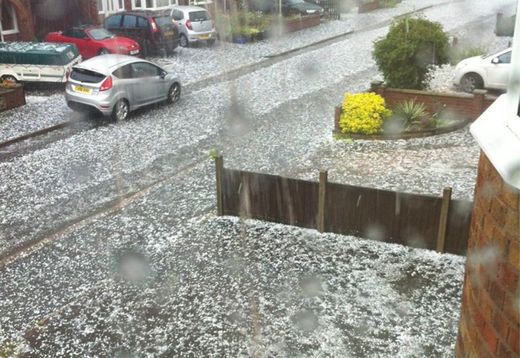
Huge hail storms pounded the UK this summer
This year's extreme weather conditions, which have devastated US cereal crops and Guatemalan maize, have claimed a fresh victim: the Cox's Orange Pippin.
Production of the quintessentially English apple, which has been around since the 19th century, is believed to be down by about a quarter this year after unseasonal weather battered blossom and stopped insects ferrying pollen around England's orchards.
Apples and other similarly affected soft fruits are the latest food items that are going to cost more and be in scarcer supply this year. Shoppers can expect to pay more for their five a day.
The cost of runner beans and broccoli has roughly trebled in the past year.Overall, the trade body English Apples and Pears estimates there will be 17 per cent fewer apples compared with last year, with Coxes and Braeburns between 25 and 30 per cent down. The industry trade body expects prices on supermarket shelves to rise by about 18 per cent to around £2 a kilogram.
"This represents a setback in the renaissance of the English apple industry," said Adrian Barlow, chief executive of English Apples and Pears. In the past five years, sales to supermarkets had risen by 65 per cent.
The upswing began eight years ago, when British shoppers spurned foreign apples in favour of home-grown varieties, in turn providing local orchards with the impetus to invest in new trees and kit.
In 2003, only 23 per cent of the apples bought in Britain were grown on home turf. Now the figure is 38 per cent. "But it's sad, because this year we are going to slip back because of weather conditions," said Mr Barlow.
Tasha Green who runs Heron Valley, a family business making organic juices and cider in Devon, said:
"It's absolutely disastrous. There's definitely going to be a very big shortage of eating, culinary and cider apples."Ms Green, who says the crops of growers she buys from are down by between 40 and 90 per cent,points out that non-organic apples are already carrying the 30-40 per cent premium usually attached to organic fruit.
"It's stressful waiting for August to unfold," she adds.
On top of the earlier poor weather, Andrew Jackson, who grows a variety of fruits on 250 acres in Ross-on-Wye, said he had suffered
three hailstorms in one afternoon recently, leaving him with bruised apples and damaged cherries.
He estimates that his turnover - at £1.6m last year - will be whittled back to just £160,000.
The climate this year has been topsy-turvy.
Unseasonably warm weather in late March led to earlier blossom. Next came heavy rains and cold spells that hit insect pollination, while frosts in mid-May caused many fruit to fall and wither.Much of the fruit that survived may bear blemishes. Mr Barlow adds that the poor apple crop is not peculiarly British:
across much of Europe production has been down by almost 15 per cent"As a result of all that, apples are going to be, relatively speaking,
scarce this year," he said, adding that this would inevitably affect the availability and price of processed products, from apple fillings to juices and cider.
Fruit growers are not pessimistic for the future, however. This is partly due to the economics of apple production. About 40 per cent of the supermarket price tag of a kilo of apples goes to the farmers; of that, half is spent on labour, growing and picking the fruit.
"So you are down to 20 per cent. If you don't have to pick the fruit, and reduce the tweaking you do - things can be put off or left for a year, a bit like gardening - you can reduce costs substantially," said Mr Jackson.
He also puts this year into perspective: he has been growing apples for 50 years, and his orchards have been in family hands since the 1920s. So while he reckons he may lose £200,000 this year, in other years he has made as much.
"It's not quite as 'end of the world' as an outsider might think," he said.
Reader Comments
to our Newsletter